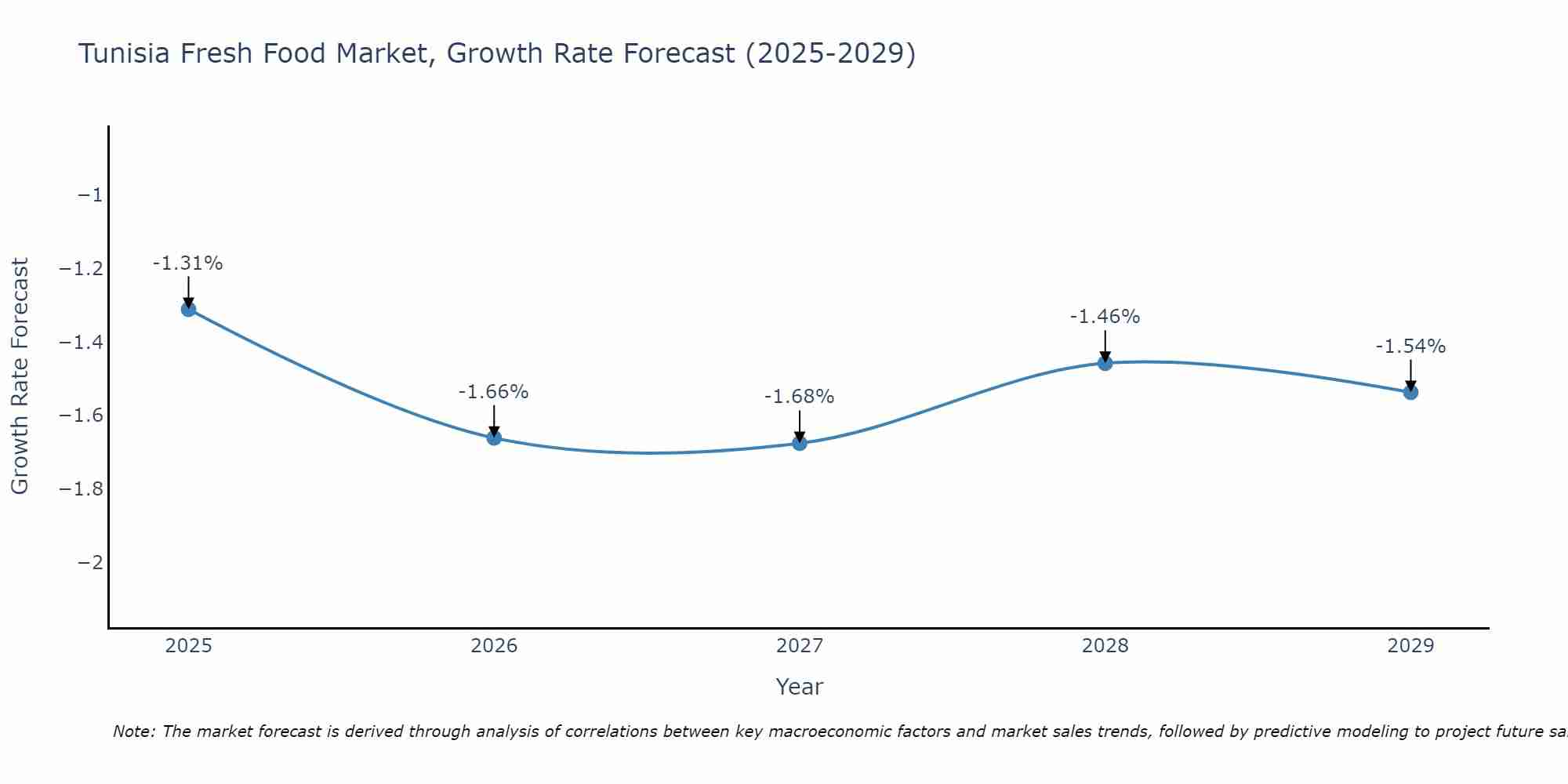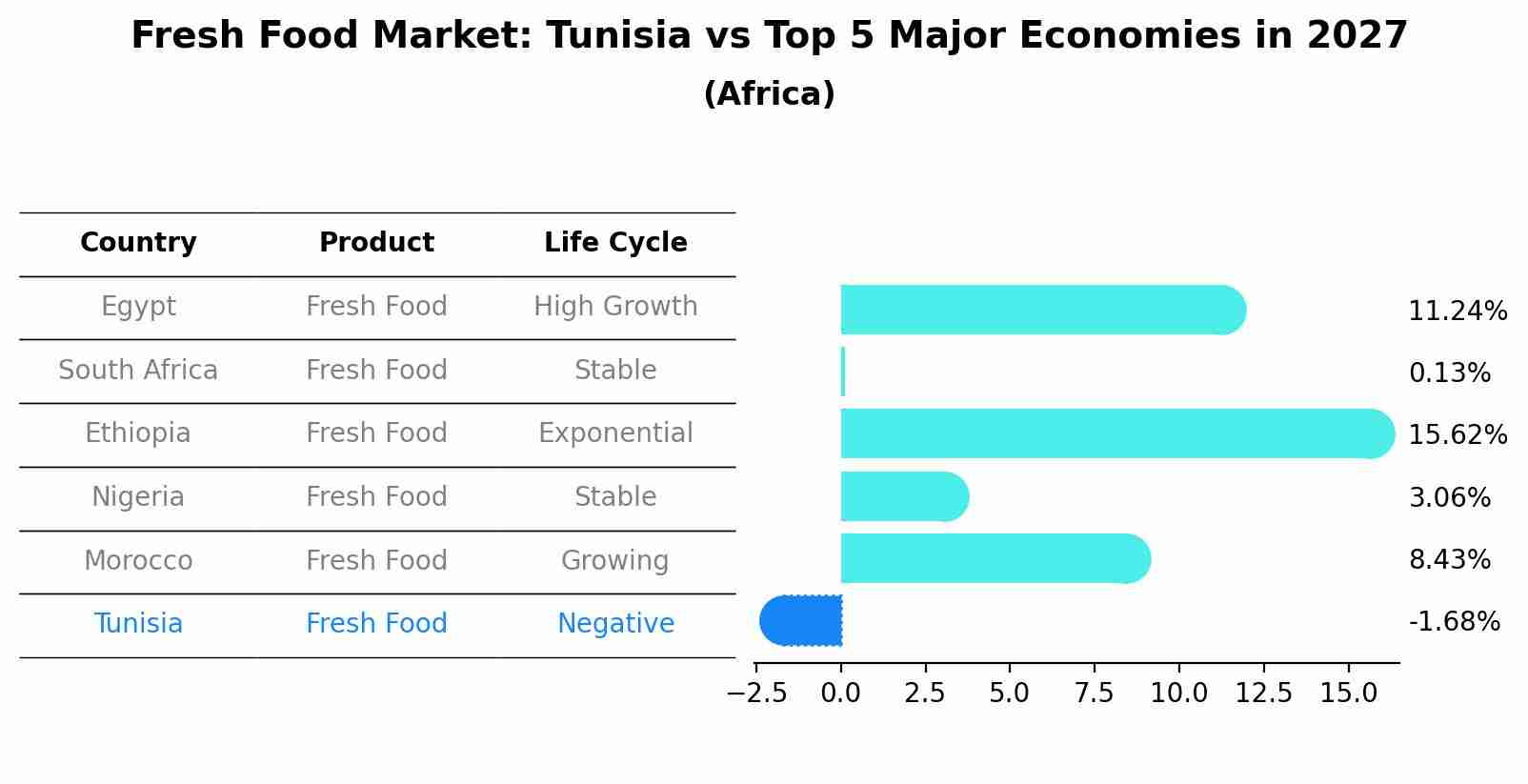Tunisia Fresh Food Market (2025-2031) Outlook | Revenue, Value, Companies, Trends, Forecast, Analysis, Size, Share, Industry & Growth
| Product Code: ETC382134 | Publication Date: Aug 2022 | Updated Date: Jul 2025 | Product Type: Market Research Report | |
| Publisher: 6Wresearch | Author: Summon Dutta | No. of Pages: 75 | No. of Figures: 35 | No. of Tables: 20 |
Tunisia Fresh Food Market Size Growth Rate
The Tunisia Fresh Food Market is projected to witness mixed growth rate patterns during 2025 to 2029. Beginning strongly at -1.31% in 2025, growth softens to -1.54% in 2029.

Fresh Food Market: Tunisia vs Top 5 Major Economies in 2027 (Africa)
By 2027, the Fresh Food market in Tunisia is anticipated to reach a growth rate of -1.68%, as part of an increasingly competitive Africa region, where Egypt remains at the forefront, supported by South Africa, Ethiopia, Nigeria and Morocco, driving innovations and market adoption across sectors.

Tunisia Fresh Food Market Synopsis
The Tunisia Fresh Food Market is a thriving sector characterized by a wide variety of locally grown fruits and vegetables, as well as fresh seafood and meat products. With a growing focus on organic and sustainable farming practices, consumers in Tunisia are increasingly demanding high-quality, ethically sourced produce. The market is also witnessing a shift towards convenience, with an increasing number of consumers opting for pre-cut and packaged fresh food items. Additionally, the rise of supermarkets and hypermarkets in urban areas has further fueled the demand for fresh food products. Overall, the Tunisia Fresh Food Market presents opportunities for both local farmers and international suppliers to cater to the evolving preferences of consumers in the region.
Tunisia Fresh Food Market Trends
In the Tunisia Fresh Food Market, there is a growing demand for organic and locally-sourced produce as consumers are increasingly prioritizing health and sustainability. This trend is driving more farmers and retailers to offer organic fruits and vegetables, as well as locally-sourced meat and dairy products. Convenience is also a key trend, with a rising demand for pre-cut, pre-packaged fresh food items to cater to busy lifestyles. Additionally, there is a growing interest in exotic fruits and vegetables, as consumers seek variety and unique flavors in their diets. Overall, the market is evolving towards more diverse and sustainable offerings to meet the changing preferences of consumers in Tunisia.
Tunisia Fresh Food Market Challenges
In the Tunisia Fresh Food Market, several challenges are commonly faced. These include issues related to infrastructure and logistics, such as inadequate cold storage facilities and transportation networks, which can lead to food spoilage and supply chain inefficiencies. Additionally, fluctuations in weather patterns and climate change can impact crop yields and quality, affecting the availability and pricing of fresh produce. Moreover, competition from imported goods, often at lower prices, can pose a threat to local farmers and producers. Furthermore, consumer preferences and purchasing power can also influence the demand for fresh food products. Overall, addressing these challenges requires investments in infrastructure, technology, and sustainable farming practices, as well as strategic marketing efforts to promote domestic fresh food products and ensure their competitiveness in the market.
Tunisia Fresh Food Market Investment Opportunities
In the Tunisia fresh food market, there are several investment opportunities worth considering. With the growing consumer demand for healthier and organic food options, investing in the production and distribution of organic fruits and vegetables could be profitable. Additionally, investing in modernizing the supply chain and logistics system to ensure efficient delivery of fresh produce to retailers and consumers could also yield substantial returns. Another potential investment opportunity lies in establishing or expanding cold storage facilities to extend the shelf life of perishable goods. Furthermore, investing in technology to enhance farming practices and increase productivity, such as greenhouse farming or precision agriculture, could be a strategic move in the growing Tunisia fresh food market. Overall, investing in the Tunisia fresh food market presents various avenues for growth and profitability.
Jordan Agar Market Government Policies
The Tunisian government has implemented various policies to support the fresh food market, including subsidies for farmers to increase production and ensure food security. Additionally, there are regulations in place to maintain quality standards and ensure food safety. The government also promotes sustainable agriculture practices to protect the environment and natural resources. Import and export regulations are enforced to regulate the flow of fresh food products and support local producers. Furthermore, there are initiatives to improve infrastructure and logistics to enhance the distribution and accessibility of fresh food across the country. Overall, the government`s policies aim to stimulate growth in the fresh food market, support local farmers, and provide consumers with access to safe and high-quality fresh food products.
Tunisia Fresh Food Market Future Outlook
The future outlook for the Tunisia Fresh Food Market appears promising, driven by increasing consumer awareness and preference for healthy and organic produce. The market is expected to witness steady growth, fueled by a growing population, rising disposable incomes, and a shift towards healthier eating habits. The government`s initiatives to promote sustainable agriculture and support local farmers are likely to further boost the market. Additionally, the emergence of online grocery platforms and convenience stores offering fresh food options is expected to drive market penetration and accessibility. However, challenges such as seasonality, supply chain issues, and price fluctuations may impact market growth. Overall, with evolving consumer preferences and supportive government policies, the Tunisia Fresh Food Market is poised for expansion in the coming years.
Key Highlights of the Report:
- Tunisia Fresh Food Market Outlook
- Market Size of Tunisia Fresh Food Market, 2024
- Forecast of Tunisia Fresh Food Market, 2031
- Historical Data and Forecast of Tunisia Fresh Food Revenues & Volume for the Period 2021 - 2031
- Tunisia Fresh Food Market Trend Evolution
- Tunisia Fresh Food Market Drivers and Challenges
- Tunisia Fresh Food Price Trends
- Tunisia Fresh Food Porter's Five Forces
- Tunisia Fresh Food Industry Life Cycle
- Historical Data and Forecast of Tunisia Fresh Food Market Revenues & Volume By for the Period 2021 - 2031
- Historical Data and Forecast of Tunisia Fresh Food Market Revenues & Volume By Fru t nd Vgtbl for the Period 2021 - 2031
- Historical Data and Forecast of Tunisia Fresh Food Market Revenues & Volume By t nd ultr for the Period 2021 - 2031
- Historical Data and Forecast of Tunisia Fresh Food Market Revenues & Volume By fd for the Period 2021 - 2031
- Historical Data and Forecast of Tunisia Fresh Food Market Revenues & Volume By gg for the Period 2021 - 2031
- Historical Data and Forecast of Tunisia Fresh Food Market Revenues & Volume By thr for the Period 2021 - 2031
- Historical Data and Forecast of Tunisia Fresh Food Market Revenues & Volume By l t n for the Period 2021 - 2031
- Historical Data and Forecast of Tunisia Fresh Food Market Revenues & Volume By u rmrkt for the Period 2021 - 2031
- Historical Data and Forecast of Tunisia Fresh Food Market Revenues & Volume By rmrkt for the Period 2021 - 2031
- Historical Data and Forecast of Tunisia Fresh Food Market Revenues & Volume By Wt nd n rkt for the Period 2021 - 2031
- Historical Data and Forecast of Tunisia Fresh Food Market Revenues & Volume By nl n for the Period 2021 - 2031
- Historical Data and Forecast of Tunisia Fresh Food Market Revenues & Volume By thr for the Period 2021 - 2031
- Tunisia Fresh Food Import Export Trade Statistics
- Market Opportunity Assessment By
- Market Opportunity Assessment By l t n
- Tunisia Fresh Food Top Companies Market Share
- Tunisia Fresh Food Competitive Benchmarking By Technical and Operational Parameters
- Tunisia Fresh Food Company Profiles
- Tunisia Fresh Food Key Strategic Recommendations
Frequently Asked Questions About the Market Study (FAQs):
- Single User License$ 1,995
- Department License$ 2,400
- Site License$ 3,120
- Global License$ 3,795
Search
Thought Leadership and Analyst Meet
Our Clients
Related Reports
- Canada Oil and Gas Market (2026-2032) | Share, Segmentation, Value, Industry, Trends, Forecast, Analysis, Size & Revenue, Growth, Competitive Landscape, Outlook, Companies
- Germany Breakfast Food Market (2026-2032) | Industry, Share, Growth, Size, Companies, Value, Analysis, Revenue, Trends, Forecast & Outlook
- Australia Briquette Market (2025-2031) | Growth, Size, Revenue, Forecast, Analysis, Trends, Value, Share, Industry & Companies
- Vietnam System Integrator Market (2025-2031) | Size, Companies, Analysis, Industry, Value, Forecast, Growth, Trends, Revenue & Share
- ASEAN and Thailand Brain Health Supplements Market (2025-2031) | Strategy, Consumer Insights, Analysis, Investment Trends, Opportunities, Growth, Size, Share, Industry, Revenue, Segments, Value, Segmentation, Supply, Forecast, Restraints, Outlook, Competition, Drivers, Trends, Demand, Pricing Analysis, Competitive, Strategic Insights, Companies, Challenges
- ASEAN Bearings Market (2025-2031) | Strategy, Consumer Insights, Analysis, Investment Trends, Opportunities, Growth, Size, Share, Industry, Revenue, Segments, Value, Segmentation, Supply, Forecast, Restraints, Outlook, Competition, Drivers, Trends, Demand, Pricing Analysis, Competitive, Strategic Insights, Companies, Challenges
- Europe Flooring Market (2025-2031) | Outlook, Share, Industry, Trends, Forecast, Companies, Revenue, Size, Analysis, Growth & Value
- Saudi Arabia Manlift Market (2025-2031) | Outlook, Size, Growth, Trends, Companies, Industry, Revenue, Value, Share, Forecast & Analysis
- Uganda Excavator, Crane, and Wheel Loaders Market (2025-2031) | Strategy, Consumer Insights, Analysis, Investment Trends, Opportunities, Growth, Size, Share, Industry, Revenue, Segments, Value, Segmentation, Supply, Forecast, Restraints, Outlook, Competition, Drivers, Trends, Demand, Pricing Analysis, Competitive, Strategic Insights, Companies, Challenges
- Rwanda Excavator, Crane, and Wheel Loaders Market (2025-2031) | Strategy, Consumer Insights, Analysis, Investment Trends, Opportunities, Growth, Size, Share, Industry, Revenue, Segments, Value, Segmentation, Supply, Forecast, Restraints, Outlook, Competition, Drivers, Trends, Demand, Pricing Analysis, Competitive, Strategic Insights, Companies, Challenges
Industry Events and Analyst Meet
Whitepaper
- Middle East & Africa Commercial Security Market Click here to view more.
- Middle East & Africa Fire Safety Systems & Equipment Market Click here to view more.
- GCC Drone Market Click here to view more.
- Middle East Lighting Fixture Market Click here to view more.
- GCC Physical & Perimeter Security Market Click here to view more.
6WResearch In News
- Doha a strategic location for EV manufacturing hub: IPA Qatar
- Demand for luxury TVs surging in the GCC, says Samsung
- Empowering Growth: The Thriving Journey of Bangladesh’s Cable Industry
- Demand for luxury TVs surging in the GCC, says Samsung
- Video call with a traditional healer? Once unthinkable, it’s now common in South Africa
- Intelligent Buildings To Smooth GCC’s Path To Net Zero


















